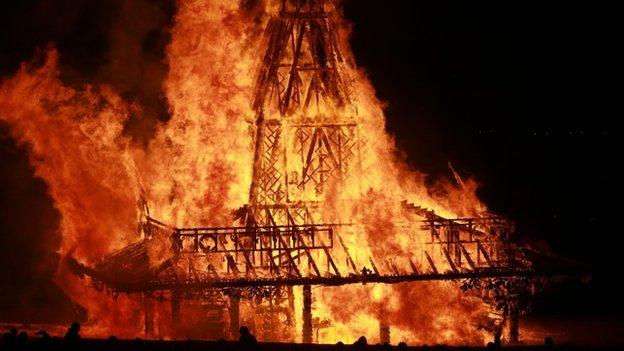What does it take to run the Burning Man festival?
- Published
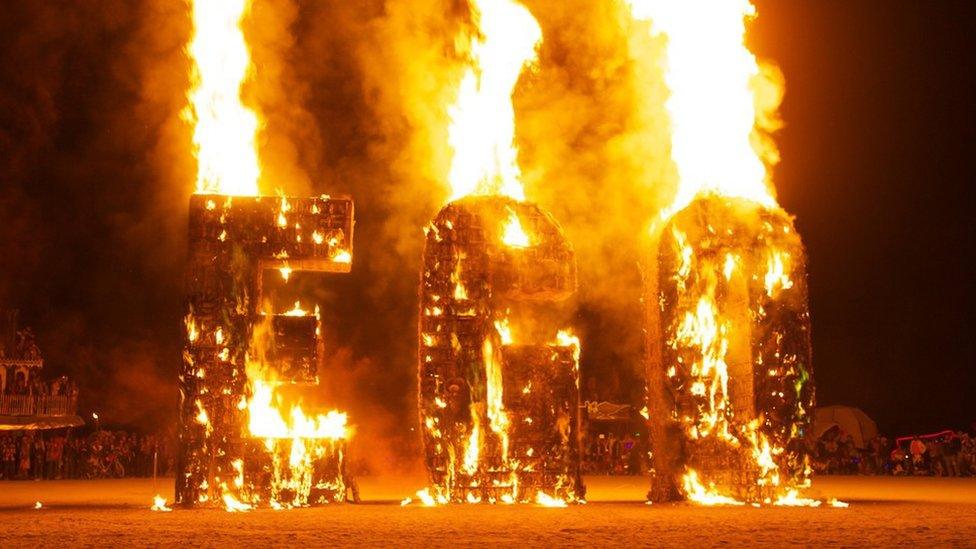
For one week every summer, up to 70,000 revellers gather in the Nevada desert for one of the world's most far-out festivals.
Wearing anything from neon-coloured tutus, to nothing at all apart from a slick of face paint, they head for Black Rock City, a "temporary metropolis" in the desert, for the Burning Man event.
The aim is for attendees to help "co-create" a huge arts festival, while surrounded by giant interactive art installations and sculptures, such as a 25ft (8m) tall steel coyote, a 30ft-tall spinning wheel, and a temporary ornate temple.
A huge wooden man is then ceremonially burnt towards the end of the event.
With 10 declared key principles, external, including "radical self-reliance", "radical inclusion", and "radical self-expression", to some outsiders the festival doesn't so much sound radical, more like a gathering of hippies.
Add the fact that many participants don goggles to guard against the occasional sandstorm, and the event is often described as "Mad Max meets Woodstock".
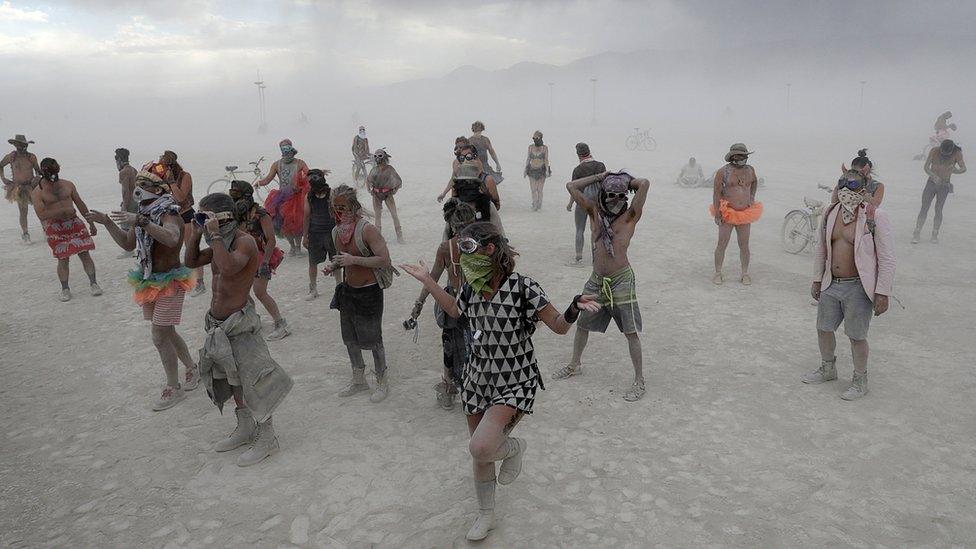
Many attendees wear goggle to protect their eyes from sandstorms
While this may sound like hell to many people, it is in fact a supremely popular and very fashionable event, with people paying $425 (£330) per ticket.
And famous attendees in recent years include singer Katy Perry, actor Will Smith, Google's Larry Page, and electric car maverick Elon Musk.
With this year's Burning Man drawing to a close on 4 September, Marian Goodell, the chief executive of the event's managing organisation, Burning Man Project, spoke to the BBC about what goes on behind the scenes, and the festival's history.
Burning Man was founded in 1986 when friends Larry Harvey and Jerry Goodell burned a wooden man on Baker Beach in San Francisco to mark the summer solstice, inevitably drawing a crowd.
This then grew into an annual festival, which in 1990 was held in Nevada's Black Rock Desert for the first time.
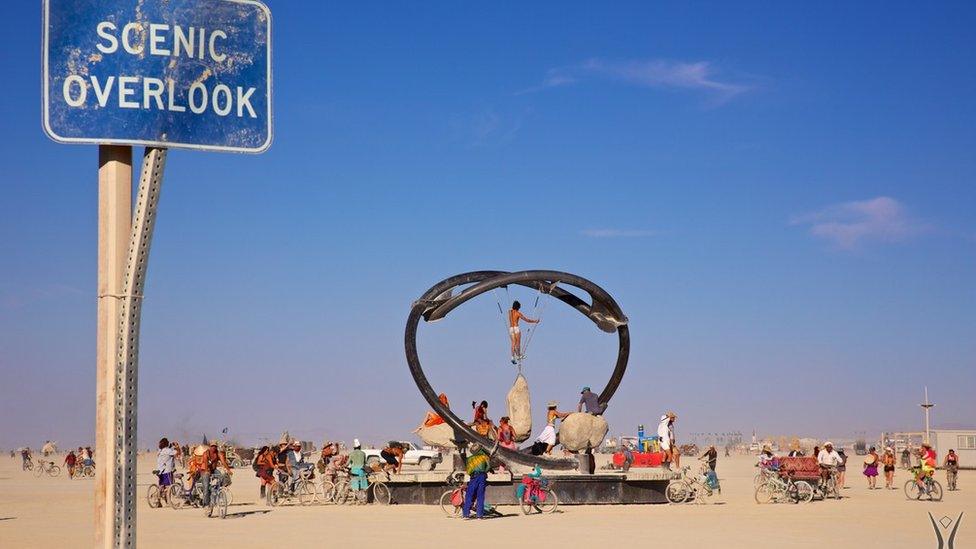
Up to 70,000 revellers gather in the desert for Burning Man
Today the operation is huge. Run as not-for-profit organisation, Burning Man Project reported annual revenues of $37.5m in 2015, of which $30.4m was ploughed back into running the event.
Ms Goodell first joined the organisation in 1996, a year after she took time out from her job as a project manager for a software development firm to experience her first "burn".
The 54-year-old remembers her first experience of the festival very well.
"It was a big beautiful desert and I remember thinking it wasn't very crowded," she says.
"I was walking along and having magical experiences. There was a real opportunity to be creative and engage."
Her first job at Burning Man was working on its marketing campaigns.
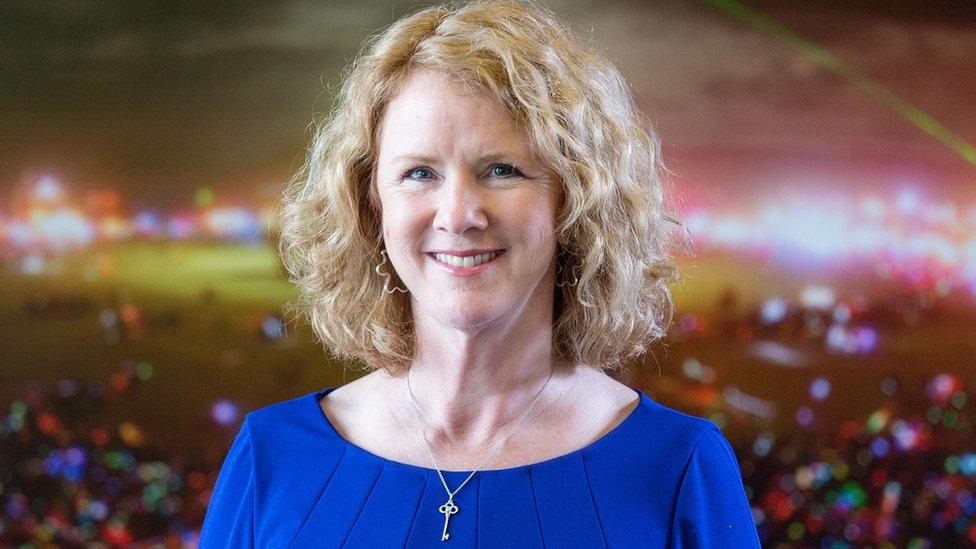
Marian Goodell has led the Burning Man Project since 2013
Looking back she says: "There were six of us working side by side and we just focused on what we were best at.
"One of my biggest passions was communications, and so my focus was giving Burning Man a visibility and a voice."
By 2013 Ms Goodell had become the organisation's first chief executive, and now leads a team of about 100 people from its San Francisco headquarters.
Her remit and responsibilities have widened too.
"I speak out in the world, and make public appearances, and work on development and raising money," she says.
"It's a challenge explaining to the world that we are more than just an event in the desert for eight days.
"The rest of the time we're doing leadership work and creating opportunities to connect with each other."
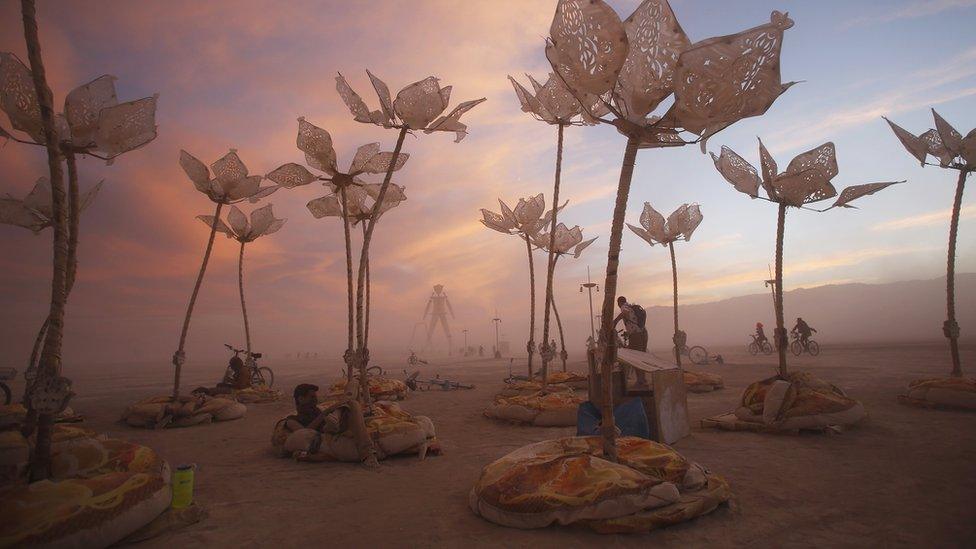
The festival features many art installations, such as Pulse and Bloom in 2014
In part, she's alluding to the around 80 Burning Man spin-off events that are now held around the world.
The team helps local groups run gatherings such as AfrikaBurn in South Africa, which attracts about 12,000 people, and Midburn in Israel, which attracts 11,000.
Although run as a not-for-profit business, the Burning Man Project also supports charity work around the world.
One example is its Burners Without Borders initiative, which helps communities to rebuild after natural disasters, or to tackle poverty.
It also works to help staff at charities and social enterprises sharpen their skills by attending Burning Men leadership conferences.
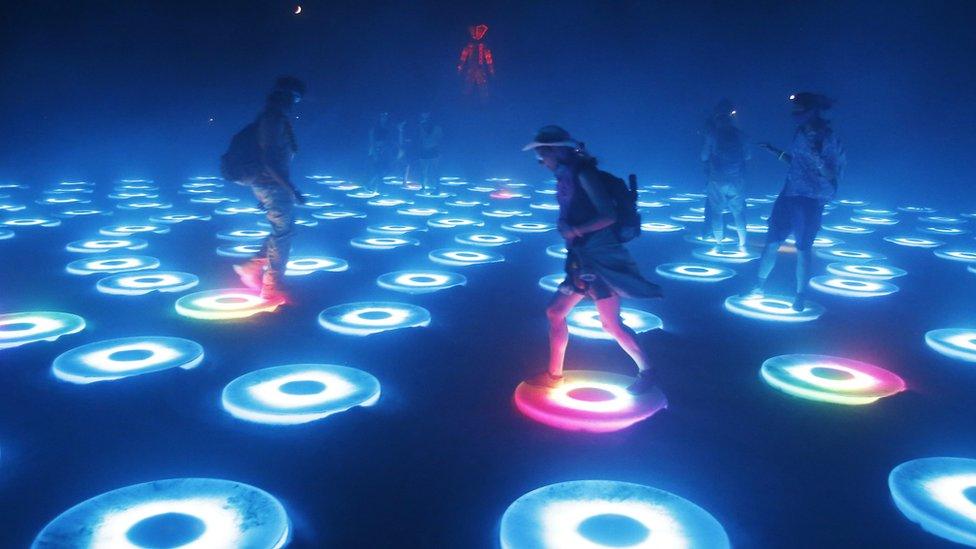
Most of the instillations allow for human interaction
Ms Goodell's job isn't all plain-sailing, however.
Last year the festival hit the headlines for all the wrong reasons when a luxury camping area was vandalised. Items were reportedly stolen, and trailer doors glued shut.
Since then Ms Goodell says that she and her team have spent a lot of time communicating what good citizenship means to festival-goers.
She also has to deal with criticism that the festival has either sold out or has become too elitist.
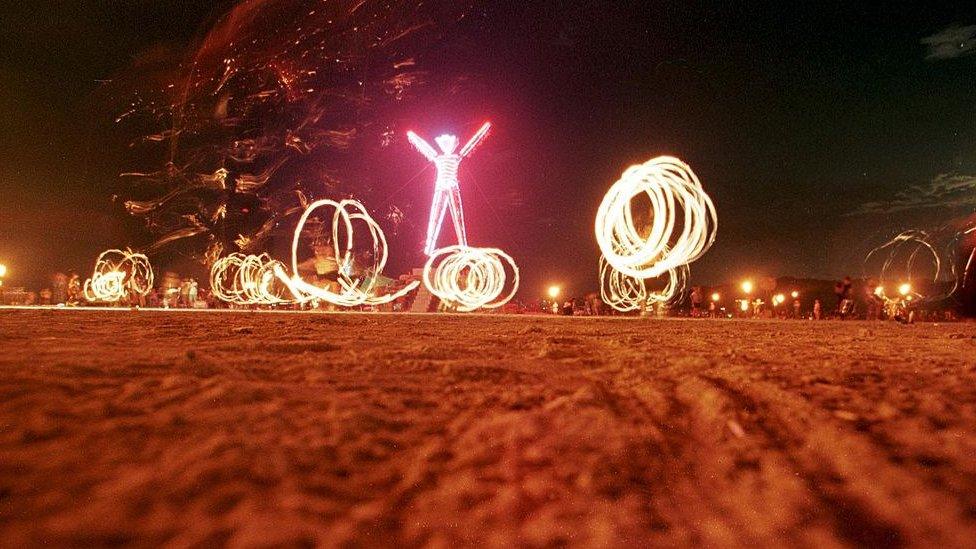
The wooden effigy of a man is set on fire towards the end of the festival
"In the 20 years I've done this, there's always someone who thinks someone shouldn't be there," says Ms Goodell.
"Before, when it was [originally just] the artists, and then the early underground techie types showed up, they [the artists] said 'what are you doing here, you gear heads?'.
"Then the hippies started coming, and the rave culture started in the 90s, and people were annoyed about that."
She says Burning Man has also been accused of selling out for attracting "really average, normal people".
"What does that even mean?" she quickly adds. "Burning Man is here to effect and change everyone's life."
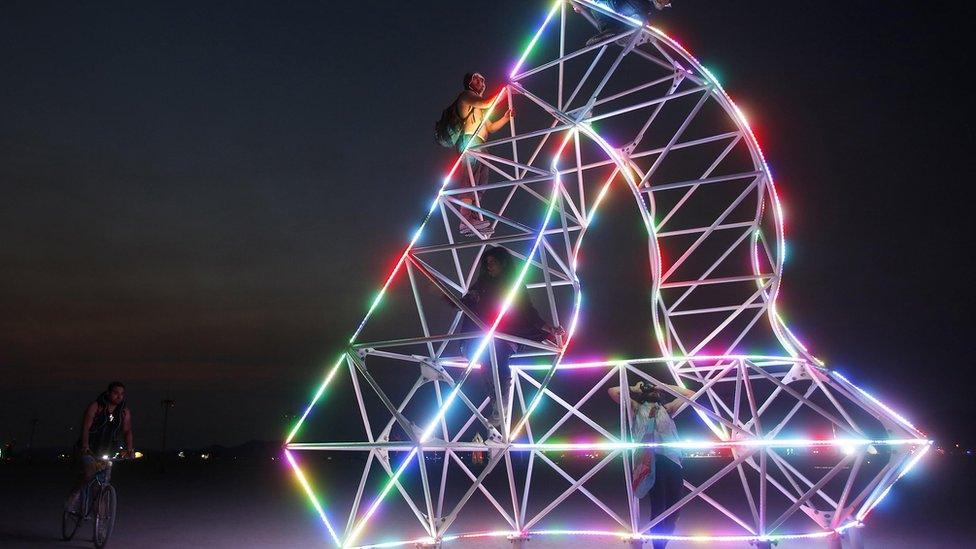
The festival appears to have a bright future
At this year's festival you'd imagine that Ms Goodall's schedule would have been full looking after the main event.
Instead she also has been running a camping area of 200 people, filled with friends, and friends of friends.
She says: "Everyone in the camp works and does a shift in the kitchen. I'll be hanging out and greeting visitors as well."
Ms Goodall has also attended her first yoga class, and attended weddings.
"There's a lot of weddings here, quite often people meet and fall in love at Burning Man - it's super cool."
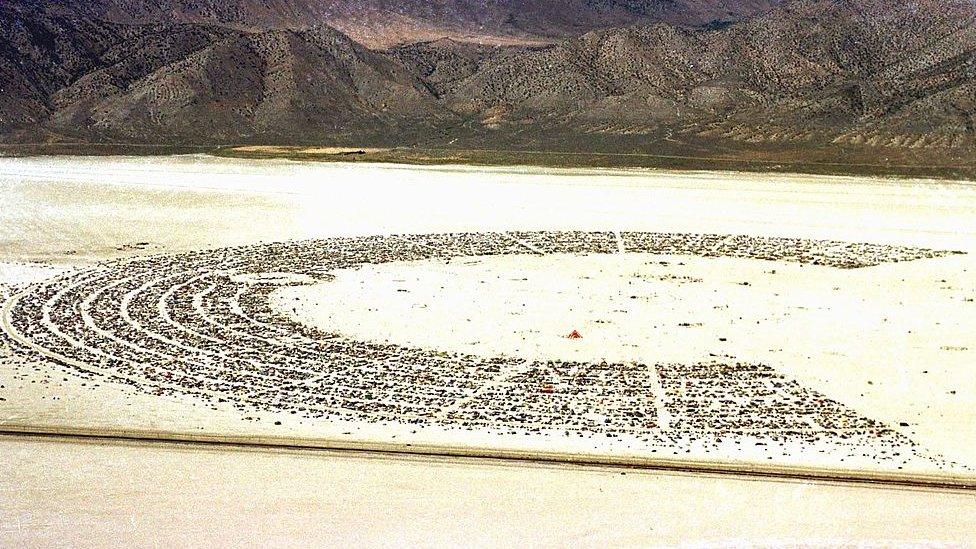
The sheer scale of the event can only be seen from the air
Ruth Oliver, a project manager at events management firm SC Productions, says that Burning Man is popular for a number of reasons.
"It's a visual festival - there are so many festivals these days, and people are seeking more for their money," she says.
"With Burning Man you get the opportunity to be immersed in the whole experience. There is also a community feel to it - people are free to express themselves through art and dressing up.
"And it has a crazy Mad Max feel to it as if you are part of something extraordinary, other-worldly."
Ms Goodall adds that working for Burning Man is a "great experience".
"I have found something where I can put my enthusiasm and skill-set and ability to work. It's about creating a transformative event, where people come away with a new sense of themselves."
- Published25 June 2017
- Published6 June 2017
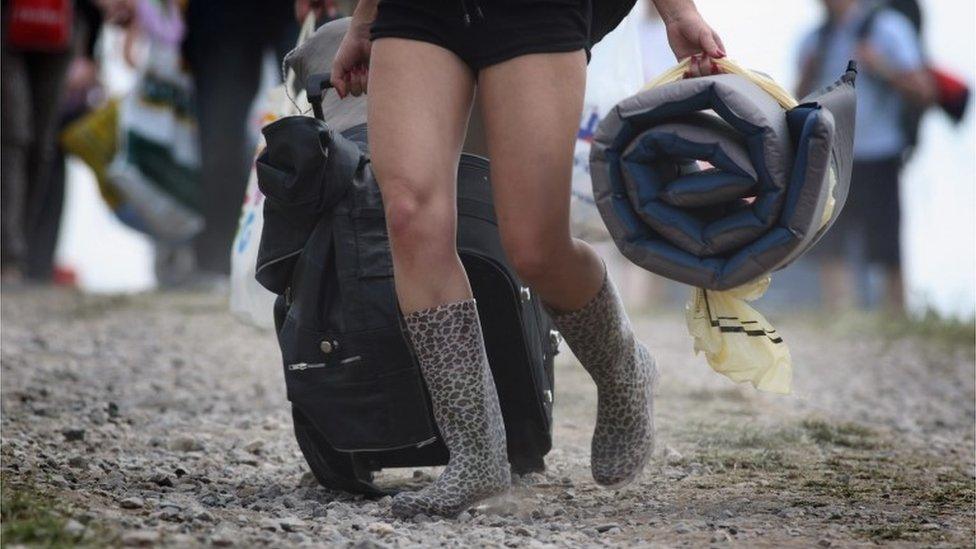
- Published4 June 2015
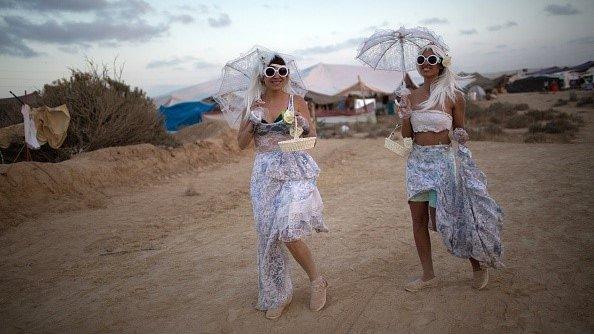
- Published22 March 2015
